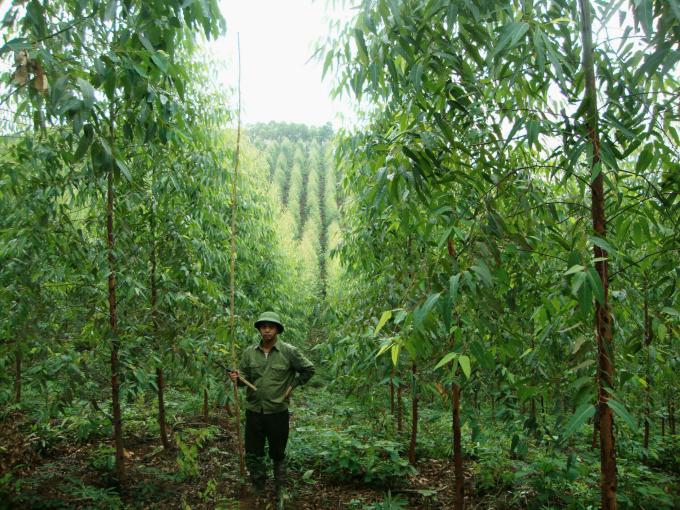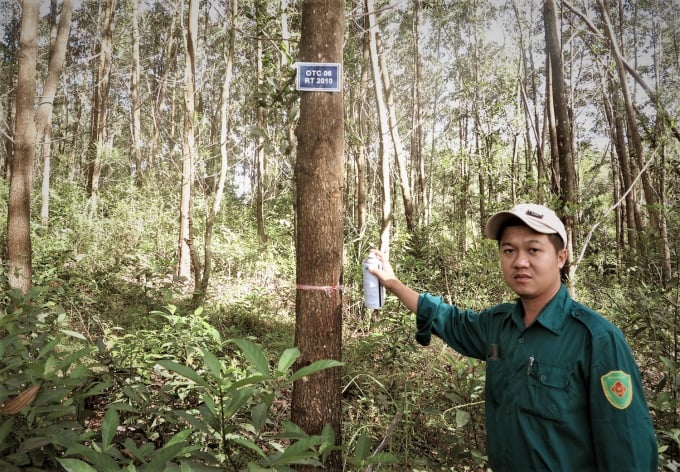November 25, 2025 | 05:33 GMT +7
November 25, 2025 | 05:33 GMT +7
Hotline: 0913.378.918
November 25, 2025 | 05:33 GMT +7
Hotline: 0913.378.918

The implementation of FCPF programme will create a new additional finance resource, contributing to investments in activities to reduce deforestation and degradation as well as increase income for forest owners. Photo: TL.
Under the agreement, FCPF will be transfered the rights to purchase emission reduction of 10.3 million tonnes of carbon dioxide at six northern central provinces of Thanh Hoa, Nghe An, Ha Tinh, Quang Binh and Thua Thien - Hue. The country will get payment of US$ 51.5 million in return.
According to ERPA, the time for calculating the results of emission reduction is from February 1, 2018 to December 31, 2024. February 1, 2018 was the time when the emissions reduction programme in North Central region was approved by the Carbon Fund.
This period was divided into three reporting phases with minimum emission reduction time and amount.
The country will receive the payment after the results are verified by the World Bank.
According to Carolyn Turk, Vietnam World Bank Country Director, the Vietnam is a leading country in implementing programmes to reduce greenhouse gas emissions from forests on a large scale.
“This agreement will create favourable conditions for Vietnam to mobilize new resources for forest protection, improve the quality and sustainable forest management. Thereby, it helps the country achieve its climate change mitigation goals.
The implementation of the emission reduction programme in north central provinces of Vietnam aimed to support forest protection and development, addressing causes of deforestation in the region. It would help reduce emission due to deforestation and degradation while increase absorption due to forest rehabilitation.
The north central region was chosen because of its importance in biodiversity. The region has a total natural area of 5.1 million hectares, accounting for 16 per cent of the country’s figure.
The forest area covers more than 3.1 million hectares with the coverage rate reached 57.7 per cent last year.
Vietnam is the first Asia-Pacific country and the fifth country in the world to reach agreement with FCPF, according to the MARD.
The agreement offered great opportunity for taking efforts to ensure a balance between forest conservation and regeneration with socio-economic development and environmental protection towards sustainable development on earth, it said.
In preparation for the signing of the agreement, the MARD has worked closely with authorities of the six northern central provinces and the World Bank from building to submitting relevant documents to FCPF.
The implementation of the programme will create a new additional finance resource, contributing to investments in activities to reduce deforestation and degradation as well as increase income for forest owners.
It is also aimed at forming a credit market to reduce emissions domestically and internationally, improve the productivity of forests and sustainable livelihoods for locals while creating sustainable development of forests in the six provinces.

The signing of an agreement between the World Bank and the Ministry of Agriculture and Rural Development is meaningful action for forest protection in northern and central provinces of Vietnam. Photo: TL.
The ERPA is expected to boost the efficiency of forest management, protection and development of the localities, creating jobs for local workers with stable production as well as ensure political stability, security and defense.
The Forest Carbon Partnership Facility (FCPF) is a global partnership of governments, businesses, civil society, and Indigenous Peoples' organisations focused on reducing emissions from deforestation and forest degradation, forest carbon stock conservation, the sustainable management of forests, and the enhancement of forest carbon stocks in developing countries, activities commonly referred to as REDD+.
Launched in 2008, the FCPF now works with 47 developing countries across Africa, Asia, and Latin America and the Caribbean, along with 17 donors that have made contributions and commitments totaling US$1.3 billion.
Four countries in the world that have signed ERPA with FCPF include Democratic Republic of Congo, Mozambique, Ghana and Chile.
Mozambique and Ghana have fully met the ERPA validity conditions and were in reporting period.
Author: Le Ben. Translated by Tran To Nhu. Edited by Duc Huy.

(VAN) ILDEX Vietnam 2026 will connect more than 250 exhibitors and 10,000 visitors from 40 countries.

(VAN) Hue City is accelerating efforts to combat IUU fishing, aiming to remove EC’s 'yellow card' and promote sustainable fisheries development.

(VAN) The recent torrential downpours and unprecedented flooding in the Southern Central Coast are a highly unusual meteorological and hydrological event.

(VAN) The Southern Central Coast and Central Highlands regions have suffered massive agricultural losses, with over 80,000 hectares of rice and crops, alongside millions of livestock, being swept away, causing severe damage to farmer livelihoods.

(VAN) Trieu Son commune deploys a 'virtual assistant' to help residents complete administrative procedures.

(VAN) Applying green technology in rural water supply and sanitation helps improve resource efficiency, protect the environment, and enhance community living standards.

(VAN) Developing biosecure livestock production is the key that helps Tuyen Quang form linked chains in livestock production and build its brand in the market.